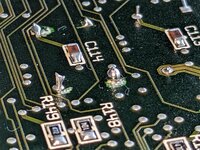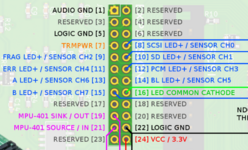I am having a strange audio issue when I use my MacSD internally in my IIsi. I modified the IIsi to have term power to the internal SCSI connector by bodging from the DB25 external SCSI connector, and I also tried powering the MacSD with an external USB wall adapter.
The machine works fine, however I can hear odd noises out of the computer that correspond with drive access and other functions, for instance moving the cursor around creates a buzzing sound, so it seems there is more than just the SCSI circuit involved. The sound comes out of the internal speaker, and if I plug in a headset the sound comes out of both channels. I have linked a video below to an audio clip taken with my phone. If you turn up the volume you can hear it clearly. When I use a spinning platter HD I do not hear the sound generally, but I did find when using a HD, if I put my ear right up to the speaker, I can hear the same sounds but at maybe 10% of the volume.
The machine is recapped with polymer caps and the board was cleaned as thoroughly as I could with IPA (a soak for an hour followed by a thorough brushing with a toothbrush. I do not have an ultrasonic cleaner. The PSU was recapped as well. The only rework done was bridging two small breaks between the pad and trace on two legs of an ALS245 chip. The board is overclocked to 25mhz, the person that installed the 50mhz crystal in the past did a butcher job, but it functions just fine. Pic of that mild carnage below. I doubt it is involved in the issue, but it never hurts to mention the small stuff.
Another thing I tried was using an 18" SCSI cable that let me move the MacSD far away from the machine in case it was creating some sort of RF interference, and there was no change in behavior.
Does anyone have thoughts on the next troubleshooting steps? Unfortunately I do not currently have another internal solid-state drive solution, so I am unable to see if the same problem exists with a BlueSCSI or ZuluSCSI.
Video:
Photo of crystal hack-job:

The machine works fine, however I can hear odd noises out of the computer that correspond with drive access and other functions, for instance moving the cursor around creates a buzzing sound, so it seems there is more than just the SCSI circuit involved. The sound comes out of the internal speaker, and if I plug in a headset the sound comes out of both channels. I have linked a video below to an audio clip taken with my phone. If you turn up the volume you can hear it clearly. When I use a spinning platter HD I do not hear the sound generally, but I did find when using a HD, if I put my ear right up to the speaker, I can hear the same sounds but at maybe 10% of the volume.
The machine is recapped with polymer caps and the board was cleaned as thoroughly as I could with IPA (a soak for an hour followed by a thorough brushing with a toothbrush. I do not have an ultrasonic cleaner. The PSU was recapped as well. The only rework done was bridging two small breaks between the pad and trace on two legs of an ALS245 chip. The board is overclocked to 25mhz, the person that installed the 50mhz crystal in the past did a butcher job, but it functions just fine. Pic of that mild carnage below. I doubt it is involved in the issue, but it never hurts to mention the small stuff.
Another thing I tried was using an 18" SCSI cable that let me move the MacSD far away from the machine in case it was creating some sort of RF interference, and there was no change in behavior.
Does anyone have thoughts on the next troubleshooting steps? Unfortunately I do not currently have another internal solid-state drive solution, so I am unable to see if the same problem exists with a BlueSCSI or ZuluSCSI.
Video:
Photo of crystal hack-job:


